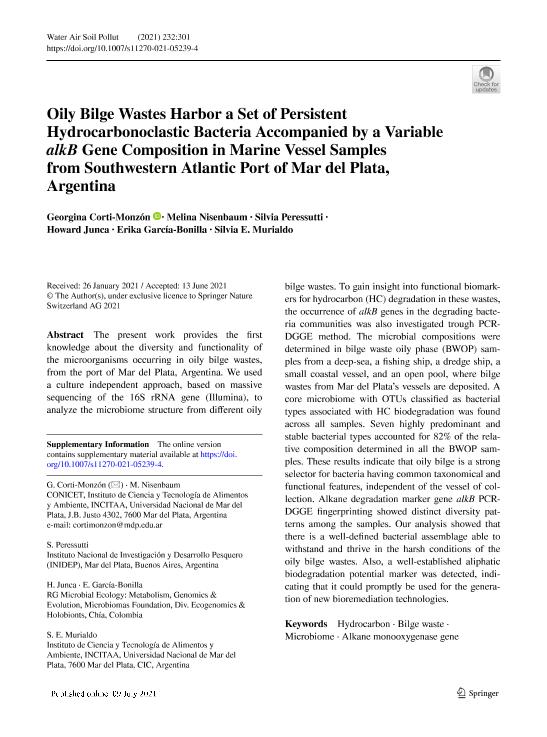Artículo
Oily Bilge Wastes Harbor a Set of Persistent Hydrocarbonoclastic Bacteria Accompanied by a Variable alkB Gene Composition in Marine Vessel Samples from Southwestern Atlantic Port of Mar del Plata, Argentina
Corti Monzón, Georgina de la Paz ; Nisenbaum, Melina
; Nisenbaum, Melina ; Peressutti, Silvia Rita Peressutti; Junca, Howard; García Bonilla, Erika; Murialdo, Silvia Elena
; Peressutti, Silvia Rita Peressutti; Junca, Howard; García Bonilla, Erika; Murialdo, Silvia Elena
 ; Nisenbaum, Melina
; Nisenbaum, Melina ; Peressutti, Silvia Rita Peressutti; Junca, Howard; García Bonilla, Erika; Murialdo, Silvia Elena
; Peressutti, Silvia Rita Peressutti; Junca, Howard; García Bonilla, Erika; Murialdo, Silvia Elena
Fecha de publicación:
07/2021
Editorial:
Springer
Revista:
Water, Air and Soil Pollution
ISSN:
0049-6979
Idioma:
Inglés
Tipo de recurso:
Artículo publicado
Clasificación temática:
Resumen
The present work provides the first knowledge about the diversity and functionality of the microorganisms occurring in oily bilge wastes, from the port of Mar del Plata, Argentina. We used a culture independent approach, based on massive sequencing of the 16S rRNA gene (Illumina), to analyze the microbiome structure from different oily bilge wastes. To gain insight into functional biomarkers for hydrocarbon (HC) degradation in these wastes, the occurrence of alkB genes in the degrading bacteria communities was also investigated trough PCR-DGGE method. The microbial compositions were determined in bilge waste oily phase (BWOP) samples from a deep-sea, a fishing ship, a dredge ship, a small coastal vessel, and an open pool, where bilge wastes from Mar del Plata’s vessels are deposited. A core microbiome with OTUs classified as bacterial types associated with HC biodegradation was found across all samples. Seven highly predominant and stable bacterial types accounted for 82% of the relative composition determined in all the BWOP samples. These results indicate that oily bilge is a strong selector for bacteria having common taxonomical and functional features, independent of the vessel of collection. Alkane degradation marker gene alkB PCR-DGGE fingerprinting showed distinct diversity patterns among the samples. Our analysis showed that there is a well-defined bacterial assemblage able to withstand and thrive in the harsh conditions of the oily bilge wastes. Also, a well-established aliphatic biodegradation potential marker was detected, indicating that it could promptly be used for the generation of new bioremediation technologies.
Palabras clave:
ALKANE MONOOXYGENASE GENE
,
BILGE WASTE
,
HYDROCARBON
,
MICROBIOME
Archivos asociados
Licencia
Identificadores
Colecciones
Articulos(CCT - MAR DEL PLATA)
Articulos de CTRO.CIENTIFICO TECNOL.CONICET - MAR DEL PLATA
Articulos de CTRO.CIENTIFICO TECNOL.CONICET - MAR DEL PLATA
Citación
Corti Monzón, Georgina de la Paz; Nisenbaum, Melina; Peressutti, Silvia Rita Peressutti; Junca, Howard; García Bonilla, Erika; et al.; Oily Bilge Wastes Harbor a Set of Persistent Hydrocarbonoclastic Bacteria Accompanied by a Variable alkB Gene Composition in Marine Vessel Samples from Southwestern Atlantic Port of Mar del Plata, Argentina; Springer; Water, Air and Soil Pollution; 232; 7; 7-2021; 1-19
Compartir
Altmétricas



